|
|
|
Sort Order |
|
|
|
Items / Page
|
|
|
|
|
|
|
| Srl | Item |
| 1 |
ID:
158992
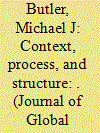

|
|
|
|
|
| Summary/Abstract |
When and in what circumstances do states turn to conflict management to manage a crisis? This article identifies a set of contextual, processual, and structural variables, examining the presence and strength of their associations with the likelihood of states employing conflict management in a foreign policy crisis. I conduct an empirical analysis of more than one thousand foreign policy crises between 1918 and 2013, using the International Crisis Behavior (ICB)-2 dataset, and with the data seek to craft a comprehensive model with the capacity to reliably predict when states will turn to conflict management in a foreign policy crisis based on the context and dynamics of a crisis as well as the attributes of crisis actors. My analysis suggests that states are more likely to employ negotiation, mediation, adjudication, and arbitration in foreign policy crises where the appeal, utility, and experience of violence is diminished; in crises involving weak, nascent, and/or transitional political entities; in crises involving fewer actors and/or crises not embedded within protracted conflicts; and in crises in which International Governmental Organizations (IGOs) are significantly involved.
|
|
|
|
|
|
|
|
|
|
|
|
|
|
|
|
| 2 |
ID:
079004
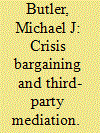

|
|
|
|
|
| Publication |
2007.
|
| Summary/Abstract |
The intersection of the study of bargaining and international crisis has proven a fertile area of inquiry that has notably excluded third-party mediation. This research chronicles this omission from the crisis bargaining literature, and seeks to identify whether mediation as a form of international crisis behavior merits inclusion in that literature. In conducting an empirical analysis of third-party mediation in international crisis, this study finds that mediation is in fact a prominent feature of international crisis, with the likelihood of mediation greatly increased in crises featuring a high overall level of violence as well as in crises of a military-security nature. On the basis of these empirical findings, this study concludes that third-party mediation is deserving of more systematic attention by scholars of crisis bargaining, offering suggestions for future inquiry to that end
|
|
|
|
|
|
|
|
|
|
|
|
|
|
|
|
| 3 |
ID:
167455
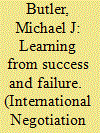

|
|
|
|
|
| Summary/Abstract |
The various contributions to this special issue reveal three overarching insights with respect to negotiation and mediation in the hard(est) cases: one, the discrepancy between securing negotiated or mediated agreements and actual solutions; two, the conditioning effects of structural and contextual considerations on the bargaining process; and three, the divergent ends to which negotiation and mediation can be (and are) directed. Ultimately, the preceding analyses suggest that, when it comes to the hard(est) cases, negotiation and mediation are best thought of as tools within a larger toolkit, which have a markedly better chance of succeeding when they are employed in an environment amenable to them. On their own, negotiation and mediation cannot be effective in cultivating ripeness in such cases. Rather, the challenge at hand is to employ other means to transform the context enveloping the bargaining environment in ways that are conducive to negotiated and mediated solutions.
|
|
|
|
|
|
|
|
|
|
|
|
|
|
|
|
| 4 |
ID:
167450
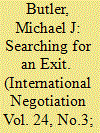

|
|
|
|
|
| Summary/Abstract |
By virtue of their defining criteria, international crises would seem unlikely candidates for conflict management and resolution. However, negotiations among crisis protagonists are not uncommon. Such behavior may reflect a desire to ‘exit’ the crisis dynamic. This article takes up the question of when and in what circumstances actors engaged in crisis situations turn to negotiation. Through an empirical analysis of over 1000 cases of foreign policy crises occurring between 1918 and 2015, this research examines a set of potential contextual, processual and structural correlates of crisis negotiation. The results of this analysis indicate that negotiation is less likely to occur in complex, high stakes, and especially violent crises, suggesting that negotiation is an unlikely and perhaps ill-suited response to more intense and severe crises.
|
|
|
|
|
|
|
|
|
|
|
|
|
|
|
|
| 5 |
ID:
113745
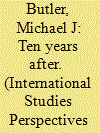

|
|
|
|
|
| Publication |
2012.
|
| Summary/Abstract |
A decade after achieving independence, the Democratic Republic of Timor-Leste (DRTL) continues to rely upon the United Nations (UN) directly and indirectly to carry out functions typically ascribed to the state. This dependency raises the specter of what scholars concerned with the breadth and extent of recent and ongoing UN operations in places such as Timor-Leste have dubbed "neo-trusteeship." This research advances an empirical accounting of, and explanation for, the emergence and persistence of neo-trusteeship in Timor-Leste. Careful scrutiny of the UN involvement in Timor-Leste betrays the origins and sources of the neo-trusteeship arrangement and suggests that neo-trusteeship is better understood as a by-product of the disjuncture between mandate overreach and organizational incapacity playing out within complex post-conflict environments rather than any intentional manifestation of "post-modern imperialism."
|
|
|
|
|
|
|
|
|
|
|
|
|
|
|
|
|
|
|
|
|